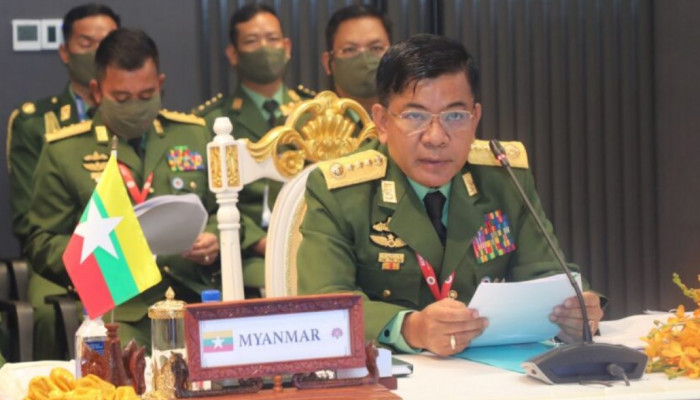Myanmar junta establishes committee for supervising nationwide military conscription
- In Reports
- 11:47 AM, Feb 15, 2024
- Myind Staff
Myanmar's military regime has established a national-level committee to oversee the enforcement of the recently enacted conscription law, marking the initial phase in implementing compulsory military service for the nation's youth.
As per the announcement by the regime, the 18-member committee is headed by Deputy Prime Minister and Defense Minister Tin Aung San. Other members include the Ministers of Home Affairs and Border Affairs, as well as key military officials such as the Quartermaster-General, Adjutant-General, and Judge Advocate-General. The Deputy Chairman of the committee is Chief of General Staff Maung Maung Aye, representing the army, navy, and air force.
The central body established under the national conscription law will establish recruitment branches at various administrative levels. Individuals summoned for military service must register with their local conscription body and undergo a medical examination. Failure to comply or feigning illness to avoid conscription is punishable by up to five years in prison.
Individuals imprisoned for evading military service will still be required to serve after completing their sentence, as stated by junta spokesman Zaw Min Tun. Approximately 13 million people, including 6 million men and 7 million women, are eligible for compulsory military service under the law, with the recruitment process set to begin in April.
The law mandates military service for all men aged 18 to 35 and women aged 18 to 27, with the age limit extended to 18-45 for men and 18-35 for women with specialized expertise like doctors and engineers. While the standard duration of service is up to two years, technicians may be required to serve for up to three years.
In times of emergency, such as the current state, compulsory service can be extended by up to five years. This enforcement coincides with a period of heightened casualties among junta troops in clashes with resistance forces, further complicated by recruitment challenges, desertions, and a lack of public support.
The law was initially enacted in 1959 during General Ne Win's authoritarian regime, and saw an amendment in 2010 under the previous junta led by Than Shwe. However, it remained unenforced throughout subsequent administrations, including those led by Thein Sein's quasi-civilian government and the National League for Democracy government, which was ousted.
It is only now, under the leadership of Min Aung Hlaing, that the decision to enforce the law has been made, coming three years after his coup initiated a popular uprising that continues to gain momentum on multiple fronts.
The enforcement of the law has instilled widespread fear among the public, with expectations of an increase in the brain drain and border refugee crisis as more young people seek to flee the country or go into hiding. Observers note that it could also provide the junta with another avenue to extort money from the public, particularly from affluent families. In response, the parallel National Unity Government has declared the law illegitimate and has urged the people to disregard it.
Image source: ANI







Comments